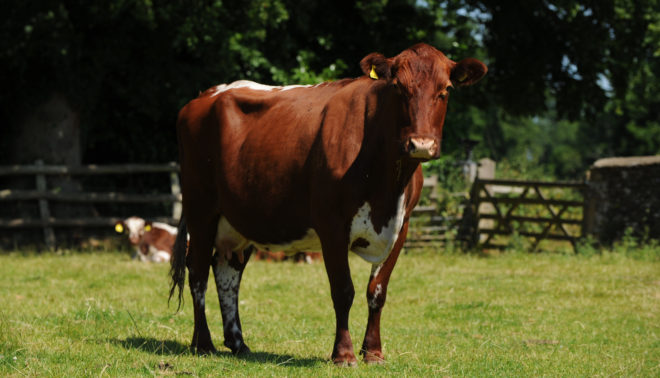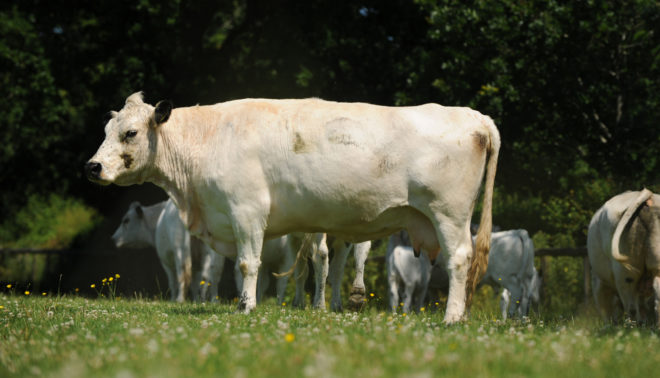Some 24 years later it is safe to say he has grasped the concept and run with it. The Highgrove estate is renowned for its environmentally friendly practices, but it’s also very much a commercial enterprise, with Mr Wilson at the helm under the watchful eye of the Prince of Wales.
Prince Charles has always had a keen interest in farming, explains Mr Wilson. “He purchased Highgrove in 1981, settled there and had a family; it became very much his own. He always had a passion for agriculture and rural issues – he wanted to farm in his own right.”
He always had a passion for agriculture and rural issues – he wanted to farm in his own right
David Wilson
Broadfield, where Mr Wilson now lives, was purchased and set up in 1985. “In the early days there was quite a lot of negativity around His Royal Highness trying a new system of farming but he said: ‘If the Duchy of Cornwall can’t afford to try it then who can?’ He was determined to do it. For me, coming from a conventional farming background, it was a bit of an eye opener.”

David Wilson manages the operation of Prince Charles: The Highgrove Estate. (Photo | Royal Press Office)
The biologically sustainable farming system started on a little block of long-term arable land, on which Mr Wilson planted some red clover and grass. “It grew much better than we expected. As the years rolled on and our confidence grew, we ploughed some of these leys out and planted some crops – we’ve learnt as we’ve gone along. We certainly now have a system which will produce food – maybe not as much as possible so it’s far from perfect, but it’s a potential model of sustainability.” And sustainability has to be the goal, he says. “It’s something that wasn’t discussed in the industry 30 years ago, we now realise it is the common goal we have to aspire to.”
Sustainability is something that wasn’t discussed in the industry 30 years ago, we now realise it is the common goal we have to aspire to.
David Wilson
The farm is owned by the Duchy of Cornwall and farmed by the Prince of Wales, who, like any tenant, pays a rent to this landlord – which also happens to fall under his own title, says Mr Wilson. “It’s a bit unique but the two businesses are totally separate – it means we are farming in a realistic situation.”
Rotations
The business runs two rotations, one of five years and one of seven years. “For the longer one we have three years of clover grass, then winter wheat, spring oats, either malting barley or spring beans, then rye at the end.”

The farm has 120ha of permanent grassland, part of which is pasture for cattle for summer use. (Photo | Ruth Wills)
Mr Wilson has recognised a decline in wheat consumption in the UK, alongside an increase in demand for coarse grains like rye and oats because of their recognised health benefits, and he has therefore adapted crops accordingly. “We’re now growing spelt, which genetically is a very old type of wheat. All of the crops have their markets before we’ve actually planted them.”
There is also a small-scale vegetable operation, which is integrated with 1,000 apple trees, of 1,000 different varieties as both an agroforestry project as well as an important gene pool.
In addition, the farm has 120ha of permanent pasture, much of which is parkland around the house at Highgrove, with a few fields dotted around for livestock grazing over the summer – important for carbon sequestration, says Mr Wilson. “We do see permanent pasture as a valuable resource, and the diversity of species is very important for animal health.”
In our crop rotations we try to plant more diverse mixtures to cope with the more extreme conditions.
David Wilson
He plans the grass mixtures so each part has a specific purpose. “In our rotations we are trying to plant more diverse mixtures, not just to feed the animals but also to cope with the more extreme conditions which farmers are starting to feel more acutely. We have summers now that can get too hot for good grass and cereal yields, and if it’s too wet exactly the same applies.”
Livestock
As well as the arable operation the farm produces milk, beef and lamb. “We sell our milk through the Organic Milk Suppliers’ Co-operative (OMSCo) of which we were one of five founder members; a lot of it goes via Waitrose as liquid milk under the Duchy brand,” says Mr Wilson. “We sell beef and lamb through the organic livestock marketing co-op but increasingly through more specialist outlets as we’re trying to develop more direct sales. We sell some of our grain to Shipton Mill and the oats go to Morning Foods.”

Besides agriculture, the farm also produces milk, beef and lamb. (Photo | Ruth Wills)
The farm doesn’t have any pigs at the moment, but it normally gets involved with whichever is the rarest pig at the time. “The Prince of Wales is a patron for the Rare Breeds Survival Trust (RBST) and is keen we support them.”
Genetic diversity is something which is really important in the quest for sustainability, and is reflected in the diversity of the farm. “We’ve lost 90% of our food genetics in 100 years and we are still losing plant DNA, and animal breeding is increasingly controlled.”
There are 100 head of Aberdeen Angus, Gloucester and British White beef cattle on the farm. “We think we can produce wonderful quality beef from grassland and forage – all our beef is non-cereal fed.”
Dairy
The dairy herd consists of 200 Ayrshires and a few Shorthorns. “When we first came here His Royal Highness said he didn’t want another black and white herd so we went for Ayrshires, and I think they have done us well on a low input system,” says Mr Wilson. “In amongst the herd there are eight original population dairy Shorthorns – they were part of a herd from a lovely old Cornish farmer who just got too ill to look after them. The RBST wanted someone to look after them, and went to the Patron (Prince Charles).
“We bought them and it gave the dear old boy some money to help him in the last year or two of his life – they had been his life’s work. We’re breeding them pure to a dairy Shorthorn bull that was recommended by the RBST,” he adds. “I’m interested in them from the point of view of breeding for extremely low cost of milk production from forage.”
The sheep and beef are all produced without concentrate feed, and Mr Wilson would like to get the dairy herd to do the same. “Last year production was around 5,500 litres because of the extremely dry weather, but normally we would be closer to 6,000 litres per year. We have also recently installed a milk vending machine for direct sales.”
Although the farm does use some antibiotics from time to time, Mr Wilson wants to reduce them and use alternative methods. “We are allowed to use antibiotics, but the focus is now on really reducing them; we don’t use dry cow therapy, we use homeopathy and herbal preparations and are now trying to breed for mastitis resistance.”
Sheep
The business runs a flock of 350 ewes in a joint venture with a young farmer, and the sheep are a really important contribution to the farm, given the cycle of soil fertility and health. “The Hebrideans were one of the first rare breeds we kept – they are now off the rare breed list, but we have kept them and we think perhaps post-Brexit we might have a marketing edge with them. Their meat is very different to normal sheep meat, it is very lean and the hogget meat is absolutely sublime. Plus, they’re incredibly easy to keep,” says Mr Wilson.

Hebridean sheep are now off the rare breed list. (Photo | Royal Press Office)
So what’s it like working for the Prince of Wales? “He’s a good man in every sense of the word – what people never talk about is that so much of his work is for other people. He wants the countryside to thrive and be prosperous, and he works with a lot of the innovation that can take us forward in the future. All the royals have a genuine understanding and passion for the countryside.”
Farm Facts
- 770ha in total
- 445ha rented by the Prince of Wales from the Duchy of Cornwall
- Contract farming 325ha




